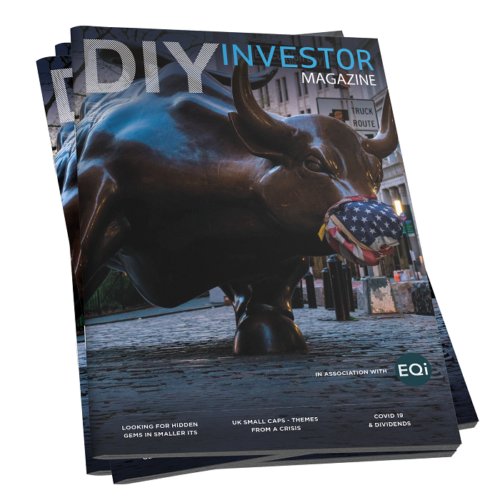Jan
2021
UK small-caps: themes from a crisis
DIY Investor
5 January 2021

UK small-caps: themes from a crisis – by Harry Nimmo, Manager of Standard Life UK Smaller Companies Trust plc
Engaging with companies is core to our equity investment process. Of course, the last few months have prevented us from physically meeting with the management teams of the UK small-cap firms in our sector.
However, thanks to technology and the removal of time-consuming travel, we have had more, not less, contact with key decision-makers.
Given this, we thought it would be interesting to share some of the themes that have emerged through these conversations. After all, it is these insights that will inform our activities in the challenging months ahead.
The strong have grown stronger, the weak have grown weaker
The crisis has exaggerated the disparity between good and bad businesses. Too many poor businesses have survived for years thanks to buoyant economic conditions, with many living off cheap debt. It’s taken a crisis like this to push those businesses beyond the point of no return.
By contrast, companies that were in strong positions prior to the pandemic (on market share, growth, strong balance sheets) have thrived relative to their peers. Many have benefited from the demise of weaker rivals. We think this trend will continue.
Covid-19 has accelerated change
Change has also come fast. One company stated that it has achieved “eight months’ work in three weeks”; another said it brought its restructuring plans forward by “three years”. Change has come in many forms. For example, we have seen a shift in demand accelerate online activity and sales. Investment in operations and technology has given businesses an additional edge over rivals. We have also seen structural shifts, resulting in cost-savings and productivity gains as employees work from home.
The take-home message? Those quickest to adapt to the new landscape have and should continue to prosper.
Digital transformation a focus
Digital businesses have thrived in the current environment. Companies across sectors highlight increased ‘digitalising’ – both external and internal – as a driving factor.
Take Kainos, the Belfast-based software firm. It provides digital technology solutions that allow organisations and people to work “smarter, faster and better”. The company works closely with the UK government on numerous projects, including rapidly building the digital infrastructure for the recent furlough programme.
ESG key to successful companies
Firms with robust ESG (environmental, social and governance) credentials have operated strongly during the crisis. A major differentiating factor has been how they have treated and supported their staff during lockdown.
Those with comprehensive employee programmes and robust internal cultures have come to the fore. Engagement has been of paramount importance. Many have ensured that training and development opportunities have been readily available. Measures to promote social interaction and communication have helped avert a mental health crisis.
Companies such as Cranswick, the UK food producer and supplier, have set up trusts for those employees that have suffered bereavement during the pandemic.
Irrespective of individual company approaches, one factor has been the same: they all have high-quality and experienced management teams at the helm. In many cases, they made decisions quickly and decisively. These ranged from the implementation of furlough arrangements to timely decisions around working from home. Such leadership should mean these companies are well placed as we slowly emerge from the crisis.
Relationships matter
Brand strength and robust long-term customer relationships have helped businesses adapt. Many food producers enjoyed deeply engrained relationships with supermarkets prior to the Covid-19 outbreak. Communication lines were strong, meaning many were able to quickly adjust to ensure the food supply chain remained intact and shelves well stocked as the crisis unfolded.
So, while the pandemic has been tragic, it has served to strengthen and further embed many relationships across the corporate world. The economy’s long-term recovery will be built of these very relationships.
The recovery will be more about the High Street than Wall Street
Stock markets have recovered strongly from the mid-March slump. However, we believe many businesses have yet to feel the full economic pain of lockdown.
As furlough schemes unwind and unemployment levels inevitably increase, consumer confidence will dip and disposable incomes will suffer. There will be follow-on impacts from weak high streets and city centres.
Retailers, restaurants and property companies will likely bear the brunt of this pain. The acceleration of the shift to online will also create further challenges for some sectors.
Nonetheless, we have been pleased at how nimble and adaptable many small-cap businesses have been. Such firms are usually the first casualties when investors panic. However, as we have shown, high-quality growth businesses have traded well throughout the crisis. These are precisely the types of companies in which we invest. We will continue to do so as we navigate through an uncertain world.
Important information
Risk factors you should consider prior to investing:
- The value of investments and the income from them can go down as well as up and you may get back less than the amount invested.
- Past performance is not a guide to future results.
- Investment trusts are specialised investments and may not be appropriate for all investors.
- There is no guarantee that the market price of a Trust’s shares will fully reflect its underlying Net Asset Value.
- As with all stock exchange investments the value of the Company’s shares purchased will immediately fall by the difference between the buying and selling prices, the bid-offer spread. If trading volumes fall, the bid-offer spread can widen.
- The Company may borrow to finance further investment (gearing). The use of gearing is likely to lead to volatility in the Net Asset Value (NAV) meaning that any movement in the value of the company’s assets will result in a magnified movement in the NAV.
- The Alternative Investment Market (AIM) is a flexible, international market that offers small and growing companies the benefits of trading on a world-class public market within a regulatory environment designed specifically for them. AIM is owned and operated by the London Stock Exchange. Companies that trade on AIM may be harder to buy and sell than larger companies and their share prices may move up and down very sharply because they have lower trading volumes and also because of the nature of the companies themselves. In times of economic difficulty, companies listed on AIM could fail altogether and you could lose all your money.
- Certain Companies treat the generation of income as a higher priority than capital growth; such Companies may deduct part or all of their management charge from capital. This will increase the amount of income available but at the expense of capital growth.
- Shares of smaller companies may be more difficult to buy and sell than those of larger companies. This means that the Investment Manager may not be able to buy and sell at the best time or may suffer losses. This could reduce your returns.
- Companies selected for illustrative purposes only to demonstrate the investment management style described herein and not as an investment recommendation or indication of future performance.
Other important information:
Issued by Aberdeen Asset Managers Limited which is authorised and regulated by the Financial Conduct Authority in the United Kingdom. Registered Office: 10 Queen’s Terrace, Aberdeen AB10 1XL. Registered in Scotland No. 108419. An investment trust should be considered only as part of a balanced portfolio. Under no circumstances should this information be considered as an offer or solicitation to deal in investments. You should obtain specific professional advice before making any investment decision.
Find out more at: www.standardlifeuksmallercompaniestrust.co.uk register for updates here.
Follow us on social media here: Twitter and LinkedIn.
GB-040920-128324-1
To buy this trust login to your EQi account
Select Standard Life UK Smaller Companies Trust GB0002959582
Click to see DIY Investor Magazine 25
Commentary » Investment trusts Commentary » Investment trusts Latest » Latest » Mutual funds Commentary


Leave a Reply
You must be logged in to post a comment.